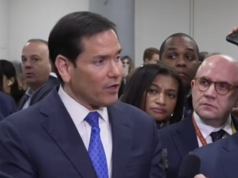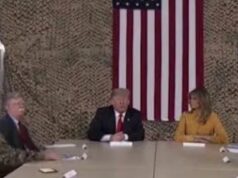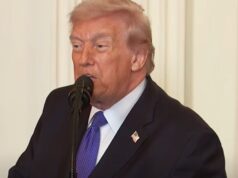Recently, a whistleblower stepped forward with documented evidence revealing the origins of the Censorship Industrial Complex following the election of President Donald Trump and the passage of Brexit in the UK.
The report was written by Michael Shellenberger, Matt Taibbi, and Alex Gutentag.
Michael Shellenberger posted the report on Twitter-X on Tuesday.
CTIL Files #1: US And UK Military Contractors Created Sweeping Plan For Global Censorship In 2018, New Documents Show
Whistleblower makes trove of new documents available to Public and Racket, showing the birth of the Censorship Industrial Complex in reaction to Brexit and Trump… pic.twitter.com/upfhL2ES05
— Michael Shellenberger (@shellenberger) November 28, 2023
“Hogwarts School of Misinformation”
“SJ called us the ‘Hogwarts school for misinformation and disinformation,’” said the whistleblower. “They were superheroes in their own story. And to that effect you could still find comic books on the CISA site.”
CTIL, the whistleblower… pic.twitter.com/dgr8Rvb7V8
— Michael Shellenberger (@shellenberger) November 28, 2023
Please tune in to @mtaibbi https://t.co/l8I1wD6BJK
— Michael Shellenberger (@shellenberger) November 28, 2023
Shellenberger also posted this on Twitter X on the US and UK military origins of the Censorship Industrial Complex.
This was also posted at his Substack page.
A whistleblower has come forward with an explosive new trove of documents, rivaling or exceeding the Twitter Files and Facebook Files in scale and importance. They describe the activities of an “anti-disinformation” group called the Cyber Threat Intelligence League, or CTIL, that officially began as the volunteer project of data scientists and defense and intelligence veterans but whose tactics over time appear to have been absorbed into multiple official projects, including those of the Department of Homeland Security (DHS).
The CTI League documents offer the missing link answers to key questions not addressed in the Twitter Files and Facebook Files. Combined, they offer a comprehensive picture of the birth of the “anti-disinformation” sector, or what we have called the Censorship Industrial Complex.
The whistleblower’s documents describe everything from the genesis of modern digital censorship programs to the role of the military and intelligence agencies, partnerships with civil society organizations and commercial media, and the use of sock puppet accounts and other offensive techniques.
“Lock your shit down,” explains one document about creating “your spy disguise.”
Another explains that while such activities overseas are “typically” done by “the CIA and NSA and the Department of Defense,” censorship efforts “against Americans” have to be done using private partners because the government doesn’t have the “legal authority.”
The whistleblower alleges that a leader of CTI League, a “former” British intelligence analyst, was “in the room” at the Obama White House in 2017 when she received the instructions to create a counter-disinformation project to stop a “repeat of 2016.”
Over the last year, Public, Racket, congressional investigators, and others have documented the rise of the Censorship Industrial Complex, a network of over 100 government agencies and nongovernmental organizations that work together to urge censorship by social media platforms and spread propaganda about disfavored individuals, topics, and whole narratives.
The US Department of Homeland Security’s Cybersecurity and Information Security Agency (CISA) has been the center of gravity for much of the censorship, with the National Science Foundation financing the development of censorship and disinformation tools and other federal government agencies playing a supportive role.
Emails from CISA’s NGO and social media partners show that CISA created the Election Integrity Partnership (EIP) in 2020, which involved the Stanford Internet Observatory (SIO) and other US government contractors. EIP and its successor, the Virality Project (VP), urged Twitter, Facebook and other platforms to censor social media posts by ordinary citizens and elected officials alike.
Despite the overwhelming evidence of government-sponsored censorship, it had yet to be determined where the idea for such mass censorship came from. In 2018, an SIO official and former CIA fellow, Renee DiResta, generated national headlines before and after testifying to the US Senate about Russian government interference in the 2016 election.
But what happened between 2018 and Spring 2020? The year 2019 has been a black hole in the research of the Censorship Industrial Complex to date. When one of us, Michael, testified to the U.S. House of Representatives about the Censorship Industrial Complex in March of this year, the entire year was missing from his timeline.
An Earlier Start Date for the Censorship Industrial Complex
Now, a large trove of new documents, including strategy documents, training videos, presentations, and internal messages, reveal that, in 2019, US and UK military and intelligence contractors led by a former UK defense researcher, Sara-Jayne “SJ” Terp, developed the sweeping censorship framework. These contractors co-led CTIL, which partnered with CISA in the spring of 2020.
In truth, the building of the Censorship Industrial Complex began even earlier — in 2018.
Internal CTIL Slack messages show Terp, her colleagues, and officials from DHS and Facebook all working closely together in the censorship process.
The CTIL framework and the public-private model are the seeds of what both the US and UK would put into place in 2020 and 2021, including masking censorship within cybersecurity institutions and counter-disinformation agendas; a heavy focus on stopping disfavored narratives, not just wrong facts; and pressuring social media platforms to take down information or take other actions to prevent content from going viral.
In the spring of 2020, CTIL began tracking and reporting disfavored content on social media, such as anti-lockdown narratives like “all jobs are essential,” “we won’t stay home,” and “open America now.” CTIL created a law enforcement channel for reporting content as part of these efforts. The organization also did research on individuals posting anti-lockdown hashtags like #freeCA and kept a spreadsheet with details from their Twitter bios. The group also discussed requesting “takedowns” and reporting website domains to registrars.
CTIL’s approach to “disinformation” went far beyond censorship. The documents show that the group engaged in offensive operations to influence public opinion, discussing ways to promote “counter-messaging,” co-opt hashtags, dilute disfavored messaging, create sock puppet accounts, and infiltrate private invite-only groups.
In one suggested list of survey questions, CTIL proposed asking members or potential members, “Have you worked with influence operations (e.g. disinformation, hate speech, other digital harms etc) previously?” The survey then asked whether these influence operations included “active measures” and “psyops.”
These documents came to us via a highly credible whistleblower. We were able to independently verify their legitimacy through extensive cross-checking of information to publicly available sources. The whistleblower said they were recruited to participate in CTIL through monthly cybersecurity meetings hosted by DHS.
The FBI declined to comment. CISA did not respond to our request for comment. And Terp and the other key CTIL leaders also did not respond to our requests for comment.
But one person involved, Bonnie Smalley, replied over Linked in, saying, “all i can comment on is that i joined cti league which is unaffiliated with any govt orgs because i wanted to combat the inject bleach nonsense online during covid…. i can assure you that we had nothing to do with the govt though.”
Read the rest here.
Yet the documents suggest that government employees were engaged members of CTIL. One individual who worked for DHS, Justin Frappier, was extremely active in CTIL, participating in regular meetings and leading trainings.











